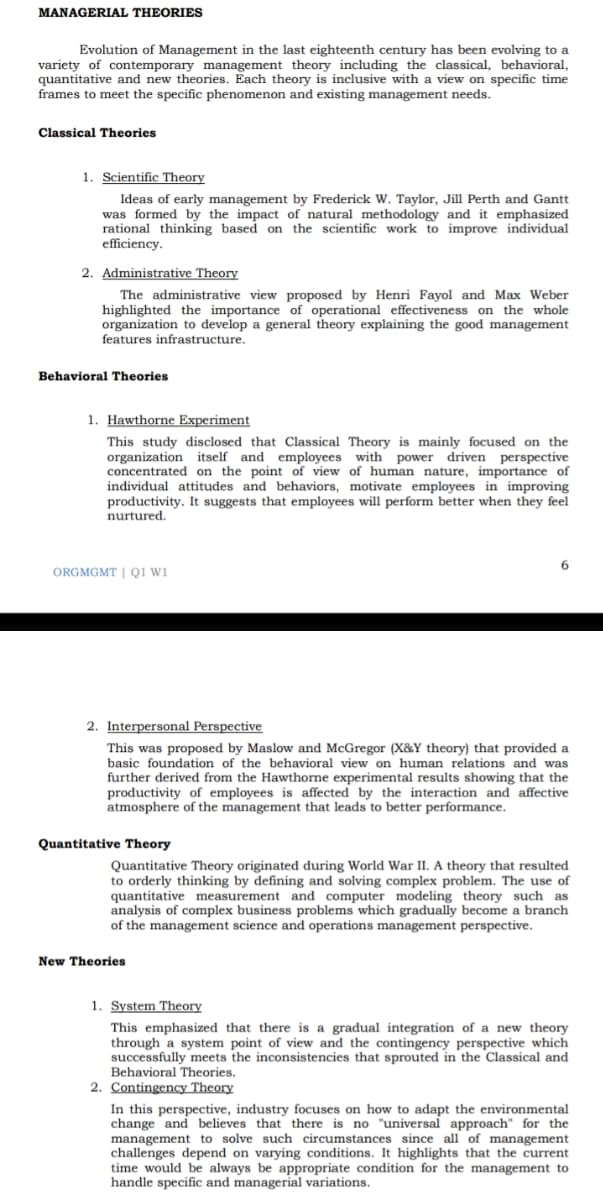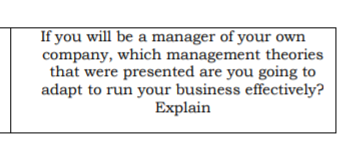If you will be a manager of your own company, which management theories that were presented are you going to adapt to run your business effectively? Explain
If you will be a manager of your own company, which management theories that were presented are you going to adapt to run your business effectively? Explain
Understanding Management (MindTap Course List)
10th Edition
ISBN:9781305502215
Author:Richard L. Daft, Dorothy Marcic
Publisher:Richard L. Daft, Dorothy Marcic
Chapter1: The World Of Innovative Management
Section: Chapter Questions
Problem 9DQ
Related questions
Question
100%

Transcribed Image Text:MANAGERIAL THEORIES
Evolution of Management in the last eighteenth century has been evolving to a
variety of contemporary management theory including the classical, behavioral,
quantitative and new theories. Each theory is inclusive with a view on specific time
frames to meet the specific phenomenon and existing management needs.
Classical Theories
1. Scientific Theory
Ideas of early management by Frederick W. Taylor, Jill Perth and Gantt
was formed by the impact of natural methodology and it emphasized
rational thinking based on the scientific work to improve individual
efficiency.
2. Administrative Theory
The administrative view proposed by Henri Fayol and Max Weber
highlighted the importance of operational effectiveness on the whole
organization to develop a general theory explaining the good management
features infrastructure.
Behavioral Theories
1. Hawthorne Experiment
This study disclosed that Classical Theory is mainly focused on the
organization itself and employees with power driven perspective
concentrated on the point of view of human nature, importance of
individual attitudes and behaviors, motivate employees in improving
productivity. It suggests that employees will perform better when they feel
nurtured.
ORGMGMT | Qi Wi
2. Interpersonal Perspective
This was proposed by Maslow and McGregor (X&Y theory) that provided a
basic foundation of the behavioral view on human relations and was
further derived from the Hawthorne experimental results showing that the
productivity of employees is affected by the interaction and affective
atmosphere of the management that leads to better performance.
Quantitative Theory
Quantitative Theory originated during World War II. A theory that resulted
to orderly thinking by defining and solving complex problem. The use of
quantitative measurement and computer modeling theory such as
analysis of complex business problems which gradually become a branch
of the management science and operations management perspective.
New Theories
1. System Theory
This emphasized that there is a gradual integration of a new theory
through a system point of view and the contingency perspective which
successfully meets the inconsistencies that sprouted in the Classical and
Behavioral Theories.
2. Contingency Theory
In this perspective, industry focuses on how to adapt the environmental
change and believes that there is no "universal approach" for the
management to solve such circumstances since all of management
challenges depend on varying conditions. It highlights that the current
time would be always be appropriate condition for the management to
handle specific and managerial variations.

Transcribed Image Text:If you will be a manager of your own
company, which management theories
that were presented are you going to
adapt to run your business effectively?
Explain
Expert Solution
This question has been solved!
Explore an expertly crafted, step-by-step solution for a thorough understanding of key concepts.
Step by step
Solved in 2 steps

Recommended textbooks for you

Understanding Management (MindTap Course List)
Management
ISBN:
9781305502215
Author:
Richard L. Daft, Dorothy Marcic
Publisher:
Cengage Learning

Management, Loose-Leaf Version
Management
ISBN:
9781305969308
Author:
Richard L. Daft
Publisher:
South-Western College Pub

Understanding Management (MindTap Course List)
Management
ISBN:
9781305502215
Author:
Richard L. Daft, Dorothy Marcic
Publisher:
Cengage Learning

Management, Loose-Leaf Version
Management
ISBN:
9781305969308
Author:
Richard L. Daft
Publisher:
South-Western College Pub